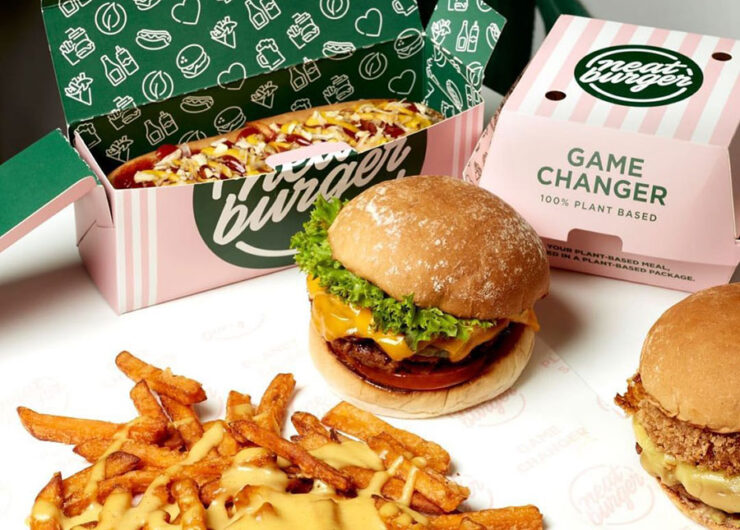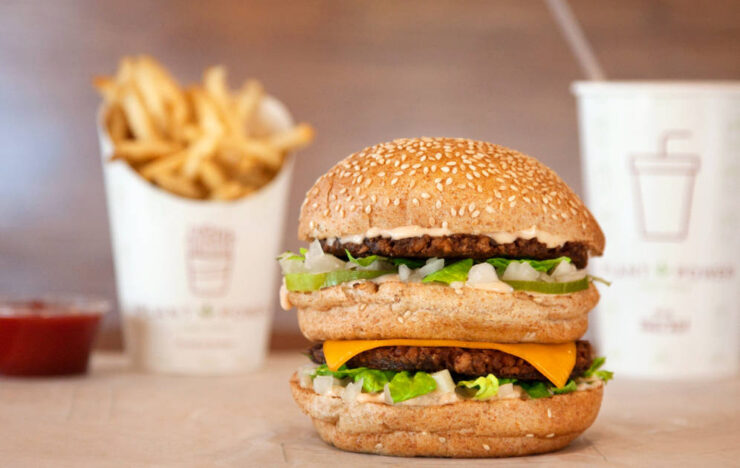Once upon a time, fast food menus were a predictable landscape of beef patties, chicken nuggets, and the rare token vegetarian option, often a flavor-lacking salad. Today, the horizon is changing rapidly, thanks to the growing popularity and acceptance of plant-based diets. The vegan scene has undergone a transformation, burgeoning with the rise of health-conscious consumers and a growing concern for environmental sustainability. Fast food chains are responding to this shifting landscape, reimagining their menus, and leading the charge in offering quick, convenient, and utterly delicious plant-based options.

Exploring Plant-Based Alternatives: Revolutionizing the Fast Food Menu
The fast food scene’s transformation is rooted in the exploration and adoption of plant-based alternatives. Veggie burgers made from lentils, chickpeas, and black beans have been around for a while, but the recent wave of innovation has brought new players into the spotlight – from Impossible Foods and Beyond Meat offering plant-based meats that taste remarkably like the ‘real thing,’ to jackfruit being used as a perfect substitute for pulled pork.
Fast food chains are not only offering these meat substitutes but going a step further by offering a full experience. This includes vegan cheese for pizzas, dairy-free milkshakes, and even egg substitutes in breakfast items. The emergence of seaweed as a substitute for fish and the use of tempeh and seitan as protein sources also showcase how vast the realm of plant-based alternatives has become. Plenty of fast food vegan options now exist – visit this site to see the choices.
It’s not just about replacing animal products. It’s also about shining a spotlight on vegetables and their versatility. Chains are using grilled vegetables, bean mixes, quinoa, and grains to create wholesome, delicious, and satisfying meals. This expanded palette of ingredients is not just changing how fast food looks and tastes, but it’s also revolutionizing how we think about it.
From Chick’n to Burgers: Innovative Offerings

The innovations in vegan fast food are nothing short of a culinary revolution. Chains are taking vegan options to the next level, and consumers are being treated to a wealth of tasty, plant-based alternatives. Vegan chicken nuggets, or ‘Chick’n,’ have been developed using a range of plant proteins and are cooked to have the same taste and texture as their meat counterparts.
Burgers have been another area of exciting innovation. Take the Beyond Burger or Impossible Burger, for instance. They not only mimic the taste of meat burgers but even replicate the ‘bleeding’ effect using plant-based ingredients. These options have become so popular that they’re now not just alternative options, but mainstream choices on menus.
In the world of dairy, plant-based alternatives like almond, soy, and oat milk are being used to create creamy and delicious vegan ice creams, shakes, and desserts. Some innovative brands have even recreated the stretchy, melty effect of cheese using plant-based ingredients, making pizzas and sandwiches just as indulgent and satisfying.
Speed and Convenience
It used to be that vegan options were found only in niche, upscale restaurants or health food stores. Today, however, some of the biggest names in the fast-food industry have embraced the vegan movement, marking a significant shift in the culinary landscape. These chains are delivering on both speed and convenience without compromising on taste and quality.
Global giants like Burger King, McDonald’s, and KFC have introduced vegan options that have received rave reviews from vegans and meat-eaters alike. These plant-based offerings are cooked quickly and served with the same speed and efficiency as traditional fast food, making vegan dining a more accessible and practical choice for everyone.
This trend isn’t limited to the mega-chains. A host of meat-free fast-food chains have also sprung up, offering a variety of mouth-watering, plant-based dishes. From Globally Local’s famous vegan Big Mac to Veggie Grill’s delicious range of sandwiches, bowls, and desserts, these establishments are proving that fast food can be quick, convenient, and vegan.
Health and Sustainability

While the taste, speed, and convenience of vegan fast food are alluring, the benefits don’t stop there. Health and sustainability are two key drivers behind the plant-powered fast-food movement. A well-planned diet can offer all the necessary nutrients, and reduce the risk of heart disease, high blood pressure, and type 2 diabetes.
Furthermore, plant-based diets have a lower carbon footprint than meat-based diets. Fast food chains offering plant-based options are not just catering to changing dietary preferences, but also contributing to environmental sustainability. This shift in the industry is also promoting a more conscious way of eating, making consumers aware of the impact of their food choices on their health and the planet.
A growing number of chains are even incorporating sustainability into their business models – from sourcing ingredients locally to using biodegradable packaging. The rise of vegan fast food symbolizes not just a change in what we eat but a shift towards a more responsible and sustainable way of life.
Global Trends and Influences

The vegan revolution isn’t limited to the United States or Europe. It’s a global phenomenon that is influenced by diverse food cultures and culinary traditions. In India, for example, where a large proportion of the population is vegetarian, fast food chains have expanded their menus to include vegan options that leverage local flavors and ingredients.
In the UK, the demand for vegan fast food has skyrocketed, with fast food chains like LEON offering a range of plant-based options. Meanwhile, in Asia, chains like Green Common in Hong Kong are transforming traditional Asian dishes into innovative vegan offerings.
These global trends and influences are adding depth and diversity to the vegan fast food scene, making it more vibrant, inclusive, and innovative. They demonstrate how vegan fast food, much like food itself, is a universal language that transcends boundaries and cultures.
Conclusion
The rise of vegan fast food represents a powerful intersection of consumer demand, culinary innovation, and environmental responsibility. It’s a testament to our collective ability to reinvent, adapt, and evolve. As we embrace this delicious revolution, we’re not just biting into a plant-powered burger; we’re taking a bite out of a brighter, tastier, and greener future.

